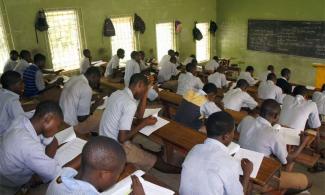
The unity schools are cheaper than private schools, and parents generally prefer the federal government colleges to public schools run by state and local governments.
Parents who hail from southern Nigeria have explained why they changed the state of origin of their children to northern states to secure admission into the secondary schools run by the Nigerian government, which are also known as unity schools.
This is coming after SaharaReporters reported how candidates from the South-East are increasingly changing their states of origin to northern states to gain admission into the federal government colleges.

Parents, who reacted to the story on social media, blamed the high cut-off marks required for candidates from the South compared to lower cut-off mark required for northern candidates to gain admission to unity schools.
They said candidates from the northern states are only required to score a fraction of that of the southern candidates in the entrance exam to qualify for admission.
They added that their children have better chances of securing admissions to unity schools when they falsify their states of origin.
"My daughter and her friend who is also Yoruba applied to Federal Govt Girls College, Bwari in FCT. Her friend got the admission and mine was denied even when she scored 73 while my daughter scored 115. I was shocked, and her parents later told me they changed her state of origin from Ogun to Kaduna to make the admission easy," wrote Muhammad Mubarak Masud on Facebook.
Onyema Daniel Ukegbu disclosed how his niece was forced to claim Niger State to gain admission into a unity school.
"My sister's daughter had to claim Niger State to beat the constraint. This is very sad for a country that wants to develop but keeps sacrificing merit on the altar of mediocrity. The question is: how long will this so-called educationally disadvantaged state policy last, 60 years after independence?"[story_link align="left"]84682[/story_link]
However, a father, Emma Okoye, said his son was denied admission despite getting a good grade, but he decided to forgo unity school rather than falsify the state of origin.
"My son's score was above average and yet denied admission," Okoye wrote on Facebook. "Well, instead of (it) demoralizing us, it spurred us to work harder to attain the goal. It's a blessing in disguise. The North enjoys free education, but we pay."
The unity schools are cheaper than private schools, and parents generally prefer the federal government colleges to public schools run by state and local governments.
For years, the federal government has maintained the discriminatory cutoffs for admission into the unity schools with candidates from some states in the South-East required to score ten times more than candidates from certain states in the North-West and North East.
Some of the reasons that the government gave for such discriminatory cutoff marks are that it gives candidates from educationally disadvantaged states the opportunity to go to school and also ensure that those states fill their quota in the unity schools.
Aliyu M. Abdullahi wondered why the federal government has such a policy.
"No region or part of a country would not perform well academically if good educational policies are put in place--policies that recognize the inherent ability of every child to learn, regardless of his faith, tribe and where he comes from," he said.
"So, I think the northern states have got to step up and do the needful for the success of their children. After all, we as a nation have more to benefit if all kids from all tribes and all regions are helped to learn and attain educational success."
Mudassir Magaji argued that the quota system allowed for fair distribution of opportunities.
"The Truth is that the government policy in admissions and other opportunity distribution in Nigeria necessitates equal distribution across the country, a common practice in some developed countries as well.
"But the problem is that there are far too many qualified candidates in the South-East and West than in the North, hence too much competition in the South.
"Southern jobs, unity schools and federal university admission spots are filled up completely with almost no single northerner and then the northern jobs, school admission are shared with southerners filling up their spots,
"Therefore, candidates from the southern part of the country adopt northern states of origin to evade the competition. However, the practice of false claim of state of origin is practically fraudulent and should be discouraged."
The practice of discriminatory cutoffs for admission into the federal government's colleges has been challenged in a court with a subsisting judgment that ordered the federal government to apply a uniform threshold for admission into the unity schools across the country.
Despite the restraining order which was given by a federal high court in Lagos about six years ago, different cutoffs have continued to be applied based on the candidates' state of origin.
Olisa Agbakoba, a former President of Nigeria Bar Association, obtained the judgment against the federal government.